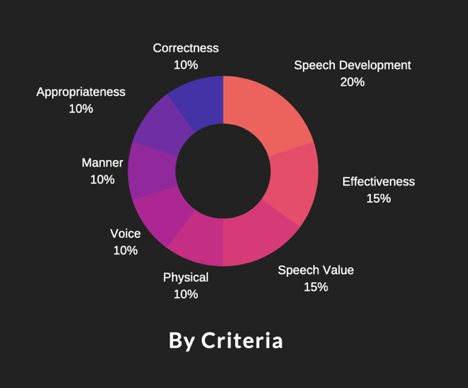Speech contests are one of the most crucial parts of a toastmaster’s journey. I joined the contest twice since I came to China and gained a lot of insights into the process of speech preparation, delivery, revision, and improvement. In this post, I am going to share my experiences while bifurcating each of the judging criteria’s which are used by the contest judges. Why use the judging criteria? Because we need to understand the requirements before we try to fulfill them. We need to understand the gaps between our current performance and the one expected by judges. For doing so, we need to do a lot of trials. I like the Chinese proverb that says, “玉不琢、不成器” i.e. A gem is not polished without rubbing, nor a man perfected without trials.

1) Speech Development
Let’s start with the one with maximum weightage. Speech development includes structure, organization and supporting material. If you want to learn how to structure, organize and support your speech, follow your manuals. My cheat book tip is to choose a topic that you are most familiar with. The more familiar you are with the topic, the better your speech development will be. If you feel like your life does not have enough interesting events to write a speech about, think again and include every single thing that happens with you or that you observer during a day. We can make at least 10 different observations during our daily commute.
2) Effectiveness
This includes the achievement of purpose, interest, and reception. All these points boil down to the fact that you have to entertain the audience, you have to grab their attention and make them remember your speech. You can do this using voice modulation and body language. My cheat book tip is to use reiteration and reassurance. If you borrowed money from someone and told him only once that you will return it. On the other hand, if you reiterated your promise several times and kept reassuring the person that you will definitely return it on time you can create a sense of trust. Same goes with the audience who needs to trust you. So don’t forget to reassure them and repeat the things you want them to remember.
3) Speech Value
This includes ideas, logic and original thought. My cheat book tip for this section is to first finalize the stories you are planning to share and than link them together with a proper transition. Your transitions should be logical and feel natural. This requires a bit of creative writing for which you can refer to online tutorials of screenplay writing. It will help you understand how to transition using sentence that maintain the original thought.
4) Physical
This includes appearance, body language and speaking area. The first time I attended the contest in India, I did not wear a tie. After the contest, one of the experienced toasmasters told me that I should have worn the tie and use my best appearance on stage. My cheat book tip for this section is to always wear formals unless your speech topic requires a specific attire/costume.
5) Voice
This includes flexibility and volume. My cheat book tip for this section is to practice the speech in front of mirror and exaggerate every emotion that you have. Using your emotions is the best way to produce a natural yet flexible voice.
6) Manner
This includes directness, assurance and enthusiasm. My tip for this section is to select a topic that is close to your heart. If you truly believe in the idea that you are sharing, your enthusiasm will naturally be more. If you don’t feel the connect with your topic, try watching more videos, reading more articles, learning more facts about it to bring it closer to your heart. We get interested in things that we read about, that we talk about and that we like sharing with others. If you can read and talk about your topic without getting bored, that means it’s the right topic for you.
7) Appropriatenes
This includes purpose and audience. My tip for this section is to study your audience. Not just in the way suggested by the manuals, but also by any other means possible. Connect with fellow toastmasters using social networks like wechat. Instead of rote learning your speech, go and say hi to the members of your audience. Try to learn more about them, their profession and their hobbies. These connections will help you a lot while you are delivering the speech on stage.
8) Correctness
This includes grammar, pronunciation and word selection. My tip for this section is to only use the words that you can describe with confidence. It doesn’t meant that you should not include any difficult or complex words at all. It means that you should be able to describe those words in your own manner. For instance the word misunderstanding can be remember by creating a funny backdrop story like misunderstanding -> “Miss under standing” -> “The lady is standing downstairs” -> “The lady is standing downstairs since her heels are so hight that she can’t climb the stairs. You are unable to understand why can’t she simply remove the heels? “
By making such funny stories, you can remember even the most difficult words and can even explain them if required. (in your own funny way).
If you wish to read more of such articles, don’t forget to follow me on LinkedIn: http://linkedin.com/in/kushalashok

You must be logged in to post a comment.